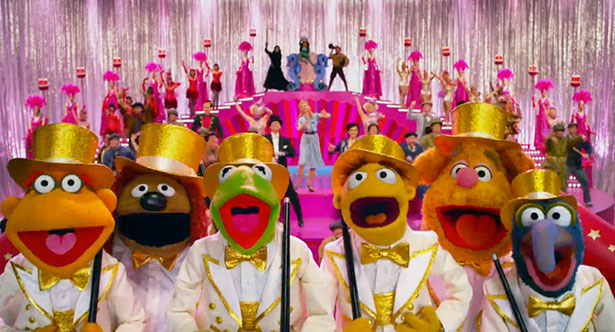This Friday marks the release of Muppets Most Wanted, the eighth theatrical production from the titular puppet creatures who have been around in some form or another for nearly sixty years. Jim Henson’s creations have stood the test the time for so long, but one has to wonder… how? How is it that a frog that was originally made out of Jim’s mother’s old rain coat and two ping pong balls & his gaggle of bizarre friends managed to become the cultural phenomenon that still persists to touch the hearts and minds of billions across the world? I mean, Disney had to have bought the property ten years ago for some reason or another, but what exactly is that reason?
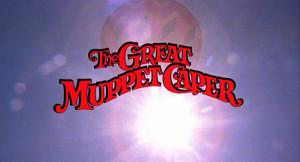
“Sure. They all have families.”
It could be the comedy. The Muppets were pretty instrumental in introducing some of the basic concepts of humor to children of several generations. Whether it be burlesque, absurdist or self referential humor, all of the Muppet characters introduced these concepts to children right after Sesame Street taught them their numbers and letters. It’s clear that Henson and company had a wide range of influences in terms of their styles of comedy, which can be clearly seen in the guest stars and cameos in The Muppet Show and the various films. Broadway legends like Bernadette Peters and Ethel Merman helped the Muppets showcase their knack for musical comedy, old school comedians like Edgar Bergen & Milton Berle allowed the Muppets the opportunity to perform vaudevillian style antics and subversive comedic presences like Steve Martin and John Cleese gave the Muppets a chance to show off how far they could swing for the fringes that were becoming all the rage during the start of the Muppets’ height of popularity in the mid 1970s. All of this showed that these seemingly glorified sock puppets were willing to experiment and appeal to a wide range of audiences, which definitely helped increase their popularity.
The Muppets’ penchant for music could also be a factor. Much like their comedic stylings, the felt Henson creations also managed to be eclectic in terms of their musical taste. They’ve performed with acts as diverse as Johnny Cash, Leo Sayer, Linda Ronstadt, Harry Belafonte, Lena Horne, Paul Simon, Diana Ross and even Alice Cooper, managing to expose children and adults to existing music that ranged from rock to pop to country to disco to African tribal. Then again, the original music contributions of Muppet productions can’t be ignored either. Frequent Muppet collaborator Paul Williams was famous for writing big hits for superstar acts of the 70s like Three Dog Night, The Carpenters and Barbara Streisand, but many would argue that his most lasting contribution to music would be his songs from 1979’s The Muppet Movie. “The Rainbow Connection” is definitely the most notable of those songs, having been nominated for an Academy Award, earned a place on AFI’s “100 Years… 100 Songs” list and covered by the likes of Kenny Loggins, Willie Nelson, Justin Timberlake and countless others. This song about a frog having big dreams and wanting to look beyond a meteorological based optical illusion for what was on the other side has touched so many, maybe because it reminds both children and the children within adults of the inner optimism we all should strive for in life. Or maybe it’s just really catchy. Either one works. There’s also a host of other songs that I could bring up (“It’s Not That Easy Bein’ Green”, “Movin’ Right Along”, “Sing”, etc), but they all go without saying… and plus, most of those were from Sesame Street and I’m not counting those public television freaks on here anyway.
Of course, it could just simply be that the Muppet characters themselves have been what helps the brand continue. In an interview with Rolling Stone, Jason Segel (star/co-writer of 2011’s The Muppets) said that he considered Kermit the Frog to be “the original Tom Hanks – the everyman.” And that’s honestly pretty damn spot on. Kermit’s persona has often been that of a bright eyed dreamer who takes responsibility as leader and rallies his fellow Muppety co-stars together. Without Kermit there to guide them, Miss Piggy would be too busy focusing on her glamourous outfits to perform, Fozzie Bear would get too hung up on how many whoopie cushions he needed for his act and Gonzo would probably cause considerable structural damage to the Muppet Theater. Kermit is the glue that keeps everything together and many a person can relate to that, whether they be a single father trying to keep his sanity or a young girl in elementary school trying to work with her fellow students on a project. Yet, we all can also relate to the other characters in some fashion; the weird outcasted nature of Gonzo, the cloying attempts to please of Fozzie, the egomaniacal vanity of Miss Piggy, the laid back smoothness of Rowlf the Dog we’d all want to have, etc. No matter how seemingly one dimensional or silly these characters could be, there’s always something to latch onto, which made the characters universal.
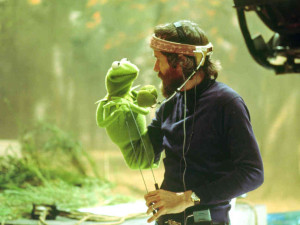
It’s important to note that, in all this time I’ve been talking about the many ways in which The Muppets have supposedly stayed popular, yet haven’t really talked about the period in history when they weren’t. Following Jim Henson’s passing in 1990, The Henson Company (lead by Jim’s son Brian) attempted to keep the characters alive through films and television specials that didn’t always click with audiences. I won’t say that none of them worked; I’ve always defended The Muppet Christmas Carol as an expert adaptation of the original Dickens tale and I even have a soft spot for Muppet Treasure Island, though that’s mostly because of Tim Curry. Still, most of these efforts weren’t as successful or acclaimed as the works done under Jim’s watch… but why? I personally think it had to do with a lack of faith in the characters. Instead of experimenting and taking risks like Jim had done back in the 70s and 80s, the Henson Company (and later Disney once they bought up the characters) decided to go with the safe route of placing the Muppets into existing properties and bringing on guest stars less for the sake of jelling with the usual Muppety antics and more because they were popular.
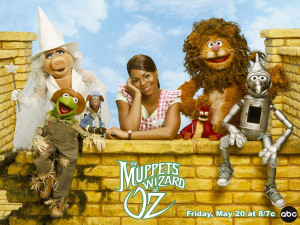
No really, this actually happened.
So, what exactly helped bring Henson’s creation out of this slump? Honestly, I felt it was recognition of all the factors I previously mentioned. One of the biggest compliments I can give the 2011 theatrical revitalization of the franchise The Muppets (it wasn’t a creative title, we can all admit that) is that it focused on bringing back all the big elements that made the titular characters so beloved; a tendency to be quite funny, an appreciation for music and the strange clash of personalities. All of those elements were so well realized by Segel and the rest of the production staff that it felt genuine. That’s ultimately what I personally love about any great Muppet production; it never feels forced. One such example of a genuine moment comes in the form of my favorite scene in The Muppet Movie. Near the end of the second act, Kermit has a confrontation with his inner conscience after the car the gang has been driving in breaks down, making their chances of getting to the auditions in Hollywood slim. His conscience (in the form of another Kermit puppet) helps Kermit realize why he needs to get past this roadblock in their adventure. He didn’t just give Miss Piggy, Rowlf, Gonzo & Fozzie the hope that they’d make it to Hollywood for the opportunity of a lifetime; he promised himself that he’d go for it.
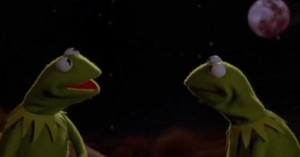
It’s a simple yet nuanced way of conveying the message that one should be honest to people and themselves about their goals to both adults and children. It’s that kind of heart and three dimensional treatment of the characters that I felt was missing from many of the initial post-Jim Muppet productions. People have become attached to these manic personalities and would like to connect with them as they go on some new journey, whether it’s attempting to live out their dreams, stopping a jewel heist or just wanting to put on a show that’ll make people happy. You can’t just dress Kermit up as The Scarecrow and expect people to immediately find it entertaining. You have to make him still feel like the frog we’ve all come to know and love, complete with all his charms and flaws. The same goes for any of the other characters. It’s moments like this that raise The Muppets from mere pieces of felt to being full fledge pop culture icons that have lasted multiple decades and continue to entertain billions. And all of those billions probably wouldn’t want it any other way.
What do you all think makes The Muppets such memorable characters? Did you feel I covered all the major reasons or did I miss something along the way? Post your opinions in the comments below!

